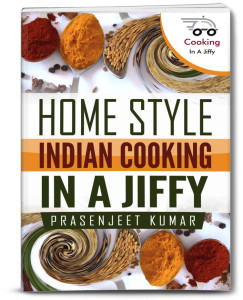Should you split your novel into smaller parts just because others say so?
- By Prasenjeet
- November 7, 2015
- No Comments
A few days back, an aspiring author contacted me asking for some advice related to the above intriguing query. Since the issues raised are important, I am taking the liberty (with the author’s permission) to reproduce the e-mail in full as below:
“Hello Prasen. As a fellow introvert and author on the edge of launching my first book I really appreciated your free ebook on how to publish without spending a dime. Also, I have spent about 20 years in the IT field and one day I woke up and realized I wanted to be a writer. My books are quite a bit different than yours-I write about zombies! Though I do have plans to diversify into other genres once I get these going.
I do have my book completed and I have a couple of beta readers going through it before I begin the publishing process. Thus I don’t have anything on Kindle to show you. However, I appreciate your open offer to help newbie writers and I wonder if I could trouble you for some advice that I don’t think you had in your free ebook about publishing. Maybe you could even answer them as a blog post so it can be shared with other emerging writers?
I have 3 books written, each about 100k words long. But after reading your advice about publishing more books rather than just a few, I began to consider breaking each of those books in half so that I could publish a series of 6 books instead of just 3. Is there any advantage to a long word count in a book in the self-publishing universe? Would you publish them all at once or string them out over a period of weeks or months?
I recognize there are a million little things that need to happen from the last word of a book until it shows up in digital storefronts, but the one thing that seems missing is a place where we (new writers) can get advice from seasoned veterans. As I said I’m an introvert by nature and I hate trawling the web looking for forums where you can ask questions. It was just happenstance I found your site, saw your books on introverts, and thought you were someone I could actually talk to. There are a million questions that can’t be answered by reading blogs. Did you seek communities or did you figure it all out by reading on your own?
Your section about using stock images is a little out of date. Fotolia seems to have been taken over by Adobe (maybe they always were?) and Dollar Photo Club was shuttered and taken over by…Adobe! Any advice on cover imagery outside of what you wrote in your book?
I love your advice on saving money. So many websites claim an author cannot publish successfully without spending US$5-10,000 for things like PR, book tours, and the like. There must be a lot of people flushing their money away. But if you were given $100 and you HAD to spend it on your next book, what would you use it for? Imagery? Editing? Audio?
Thank you for your time.”
E.E. Isherwood
And here is my reply:
Hi Isherwood,
Thanks for reaching out to me. It is always a pleasure to help out a fellow writer.
Before I proceed further, I must start with a few caveats. First, the world of publishing is in a constant flux. Technology is improving, algorithms for deciding your books’ sales rank and even discoverability are changing, old trends disappear and new trends emerge, what worked once as promotion no longer works, and so on.
But the only thing that still works is listening to your heart and being true to yourself. So keep this in mind while I try to answer all your questions. 🙂
Should you break your novels into smaller parts? Nope. That’s a bad idea. 🙂 Not only will it create unnecessary hassles for you but may mess up your entire story, characters and plot line. This strategy (of breaking) may work better in non-fiction. For example, suppose you were writing a cookbook and had both chicken and fish recipes. You could probably split the book into two: one with chicken and the other with fish recipes. However, in fiction, if you did that, I seriously believe that you may end up compromising on quality (which is absolutely essential). Anyway that is purely my opinion but I can give you a list of questions that may help in determining whether you should split your books into smaller parts.
* What happens to your plot? Will it end abruptly because you chose to split it into smaller parts?
* How about your characters? Will you leave out something/someone essential and interesting?
* What about your twists in the plot? Will you leave something unanswered that instead of tickling the readers’ curiosity dissatisfies or even annoys them?
* Will you compromise on overall readability? Your readers pay for reading the whole story and not bits and pieces of it.
Writing more books: I sincerely advise writers to write more books because writing more books simply makes you more discoverable. Plus the readers who love any of your books have the option to buy more. Think of this like a book shelf. Will you notice one book by a writer more than if he had ten on the same shelf? In my writing career, I have tried all sorts of promotion and whatever growth I have seen in revenue is only because I have written more books. That being said, I really don’t believe that you should split one book into many. You won’t do justice to yourself and to your readers. I suggest leave all of your books as they are. I am sure you will have plenty of ideas and creative juices left to write Books 4-infinity. 🙂
Is there any advantage in writing longer books? Well, if you go exclusive with Amazon, they have a programme called Kindle Unlimited where you are paid @ per pages read. This means that the longer your book is, the more you may get paid (provided your readers keep the pages turning). However, there are real dangers with going exclusive with Amazon. If Amazon is your only source of income, think of the hit you will take if something happens to Amazon. Plus you will lose out on finding readers on iBooks, Kobo, Nook, Google Play, etc. There are many pros and cons for exclusivity and you are the best judge to decide what is best for you at a particular juncture in your writing career.
I believe that you should be sincere to art. Don’t write longer or shorter books because others say one is “profitable” than the other. A few years back, many authors were advising in favour of writing shorter books and I refused to buy the idea. Now Amazon has its own way of punishing authors who write shorter books. This is what I said in the beginning. Algorithms change. Trends change. What you can do is to be faithful to your art. Feel free to write a 100,000 word novel or a 30,000 word one, whatever you think will do justice to your story.
Should you publish your books all at once or space them out? Since I write one book at a time, I publish it that way. Write one book, publish it, market it and then write another and repeat the process. However, if you have already written three books, and if you can deal with all the logistics (of editing, cover designing, formatting and so on) you may like to publish them altogether. I see no reason why you should then space out publishing.
Your question about whether I seek communities or figure out publishing all on my own: I really don’t like to hang out on many fora. In my experience, you generally get very wishy washy advice on most hang outs. I do, however, follow a few blogs which give really helpful advice to other writers. Here are a few of them:
- Business Rusch: This is a blog by an author named Kristine Kathryn Rusch. She has over 30 years of experience in publishing both traditional and indie. She is like a parent when it comes to advice on writing. Here is her blog: http://kriswrites.com/category/business/
- The Creative Penn: Author Joanna Penn also has a fantastic blog which is very helpful to writers. Here is her blog: http://www.thecreativepenn.com
Your question about stock images: You are right. All these stock image websites also keep changing. Fotolia has become pretty expensive. I think Dollar Photo Club is still cheap. Even if you have to pay a few extra dollars, it could be worth the cost. You can also go to one of the fiverr cover designers who can both find a stock image and then design your cover.
You can also shoot your own images with your camera. I have done that for a few of my cookbooks but really don’t know how you can shoot images relating to zombies? 🙂
If I had $100, where will I spend it? I was faced with this question. I had $40 to spare. I considered using Book Gorilla which is an advertising site for books. However, I realized that this will be a very short term investment. You get a spike in sales which will only last for a few days. Plus the dangers of losing money. So instead of spending $40 on advertising, I chose to re-design my book covers by hiring a professional for $5 from Fiverr.com. Your book cover improves your packaging and makes a real promise to your readers. So if you have to spend money, spend $5 to get a professional e-cover design. And then spend another $ 5 or so to convert that for your print version. In addition, you may need another $5 for a stock image or $10 for two stock images that need to be combined to get that special effect. I have already talked about editing without spending a dime so there is no need to spend money there. For marketing, you can try out BK Knights for another $5 simply because this guy returns your money if he doesn’t succeed in getting you more sales.
What happens to the rest of $80 or so? Save it for the future or invest in mutual funds so that it keeps growing. 🙂 This is what I would do. Please don’t take this as an investment advice. Your writing career is very uncertain and your book sales will go up and down. So it is best to protect yourself from the downside.
I hope I have answered all your questions. Feel free to contact me, should you have any more doubts. I wish you all the best with your writing career.
Would you mind if I published this answer with your question on my blog to help other writers?
Regards,
Prasenjeet
And this is what Isherwood wrote back:
“Wow! Thank you so much for your time and response. I would love it if you posted your response on your blog. I don’t mind if you mention me by name as E.E.Isherwood. Hopefully it will help others.
I don’t want to publish exclusively to Amazon. My plans match the advice in your book. Publish in as many places as possible, get it in front of many different audiences. See what happens. I want to do audio versions. Translations. The whole works.
As a quick response I’d like to say I did consider the story arc when thinking about breaking my books apart, but you bring up excellent points about quality and readability and especially delivering a quality product to our readers. I wrote my 3 stories to be conjoined as a trilogy. There are moments of foreshadowing. Clues placed in book 1 that are solved in book 3 and everything works together both to give an enjoyable series of independent stories and a satisfying (I hope) trilogy. I could break them into 6 smaller books, but I’d probably have to spend a lot of time ensuring these elements still worked, as well as ensuring the breaking points made sense and were satisfying. I think I could do it, but at the end of the day your advice is spot on–I could just write another book! I do indeed have a vision of the world I created (or destroyed, since we are talking about zombies) and the number of books I could write is only limited by my time.
I’ll be checking out the links you provided, plus those in your Ebook. I’m a do-it-yourself type of person, so your advice really hits home with me.
I’d also like to publicly say thanks on my tiny blog and on twitter. Is there any link to your site/books you’d prefer me to use? I’d like to help you out for your time in any way I can.
Thanks again for the lengthy and very helpful response.”
What are your views, dear reader?
Have you ever been advised to split your novel into smaller parts? Did you follow that advice?
Do you prefer to write longer or shorter books? Are there any blogs that you follow for advice?
If you had $100, where would you spend it?
Feel free to leave your comments below.
































Leave a Reply